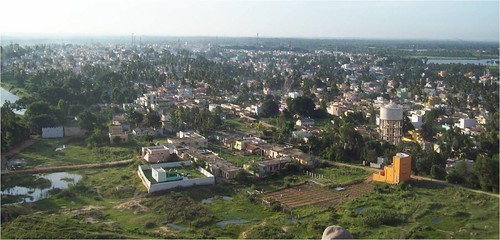Wastewater
Influence of anthropogenic contamination on fluoride concentration in groundwater: A study of Mulbagal town, Kolar district, Karnataka
Posted on 15 Feb, 2013 04:53 PMGroundwater contamination is a serious, but relatively ignored issue in the country. This contamination occurs in either through geogenic or anthropogenic means. Fluoride contamination is one such example of geogenic contamination that is widely found in the Kolar district of Karnataka. However, the fluoride levels in the town of Mulbagal are lower than those in the surroundings. Earlier, a study was conducted on the impact of pit toilets on the groundwater in the area. The present paper investigates the presence of any link between these two phenomena.
Handbook for flood protection, anti-erosion and river training works by Central Water Commission (2012)
Posted on 13 Feb, 2013 09:43 PMThis handbook by Central Water Commission aims to provide necessary guidance to the field engineers in the state and central for design, appraisal, construction and monitoring of the flood management works covering all the relevant BIS codes, design manuals, guidelines, technical specifications for construction materials and practices etc. to meet new challenges in the flood management in India.
Guidelines for decentralized wastewater management by Ministry of Urban Development (2012)
Posted on 12 Feb, 2013 07:36 PMThis guideline is prepared by the Centre of Excellence in the area of Decentralized Wastewater Management, in the Department of Civil Engineering at Indian Institute of Technology, Madras, which comes under Ministry of Urban Development
Wastewater management: A case study of Tiruchirapalli city in Tamil Nadu
Posted on 28 Jan, 2013 11:43 AMAny form of liquid waste discharged by domestic residents, industries, agriculture and commercial establishments into water is called a wastewater. This water contains different quantities of contaminants which pollutes water and makes it unfit for any productive or domestic use. Set against the backdrop of dire need for effective and efficient management of wastewater, this paper is a case study of Tiruchirapalli city in Tamil Nadu. The analysis provided in the paper is an outcome of the field work carried out in the city, which emphasises for developing a strategy for the management of wastewater.
Wastewater irrigation in Hubli–Dharwad, Karnataka, enables farmers to diversify their cropping practices - A paper in the Environment and Urbanisation Journal
Posted on 26 Jan, 2013 06:47 PMThis paper 'Wastewater irrigation in Hubli–Dharwad, India: I
Compendium of sewage treatment technologies by Indian Institute of Technology, Kanpur
Posted on 24 Jan, 2013 04:14 PMThis compendium of sewage treatment technologies by the Indian Institute of Technology (IIT), Kanpur has been prepared, based on primary and secondary data gathered from operation of sewage treatment plants (STPs) in the country over the last two decades.
Water: Towards a paradigm shift in the Twelfth Plan - A paper by Mihir Shah in the EPW
Posted on 22 Jan, 2013 10:37 AMA fundamental change in the principles, approach and strategies of water management in India has been proposed in the Twelfth Plan
Why is this paradigm shift needed ?
Draft report on the exploratory study on wastewater irrigation in Gujarat by People in Centre Consulting- e-disha newsletter for January 2013 from Consortium for DEWATS Dissemination Society (CDD)
Posted on 18 Jan, 2013 02:52 PMArticle and Image Courtesy: Consortium for DEWATS Dissemination Society

Everything about water expo - International exhibition & conference on water & wastewater management, EA Water, Chennai Trade Centre, Nandambakkam, Chennai, February 28 to March 2, 2013
Posted on 09 Jan, 2013 10:04 AM EverythingAboutWater EXPO is South Asia's largest exhibition and conference coverin
EverythingAboutWater EXPO is South Asia's largest exhibition and conference coverin





